1. Alcohol (ethanol) enters the body through the oral cavity (i.e., the mouth). The inner surface of the oral cavity is mucosal tissue to keep the cavity lubricated and it is capable of absorbing alcohol into the bloodstream. This absorption is considered “insignificant”.
2. Alcohol flows down the oesophagus to the stomach where 10-20% of ethanol will be absorbed into the bloodstream. Alcohol enters the bloodstream via the mucosal tissue of the stomach wall, and travels straight to the liver. Alcohol can take 5-10 minutes to reach the brain because of the ethanol absorbed via the stomach. If you drink alcohol on an empty stomach, the pyloric sphincter [gateway between the stomach and the small intestine] is going to be more open, and the alcohol is going to immediately enter the small intestine after reaching the stomach. If food is also present in the stomach, the sphincter will open and close at a rate that allows food to enter the small intestine gradually, therefore if alcohol is also in the stomach, it will gradually enter the small intestine.
3. Alcohol flows through the pyloric sphincter into the small intestines where most alcohol absorption occurs. Human intestines are attached the to the posterior abdominal wall by a fold of membrane called the mesentery. Alcohol is absorbed into the mesentery via veins and then travels to the liver.
4. One function of the liver is that it detoxifies toxic elements into non-toxic elements before passing it to the heart and then the rest of the body. The liver sustains considerable “abuse” from a variety of toxic elements and chemicals, and therefore it needs to be capable of full regeneration. NOTE: Many diseases and exposures can harm it beyond the point of repair. These include cancer, hepatitis, certain medication overdoses, and fatty liver disease.
In the liver, ethanol is met with an enzyme called alcohol dehydrogenase and converts ethanol into acetaldehyde [ass-eh-tal-de-hide]. This chemical is more toxic than ethanol, so the liver uses another enzyme to convert acetaldehyde into acetate, which is non-toxic to the human body. NOTE: the amount of alcohol consumed + the timeframe it is consumed [and a variety of other factors] will influence the ability of the liver to effectively convert acetaldehyde all the way into acetate. The liver can’t handle the entire workload effectively therefore ethanol (before being metabolised) will go straight from the liver to the bloodstream and make its way directly to the heart.
NOTE: Genetics will play a role! Certain people do not produce the liver enzymes in enough quantity to properly breakdown ethanol.
5. Blood leaves the liver through the hepatic veins. The hepatic veins carry blood to the inferior vena cava—the largest vein in the body—to the right side of the heart. The heart will beat and send the incoming blood to the lungs to oxygenate and expel carbon dioxide as we breath out. This is how ethanol can be on your breath. Inside the lungs, at the very end of the bronchioles, are hollow air sacs called alveoli where there is a gas exchange. Ethanol evaporates through capillaries into the air sacs and exhaled out of the body. Breathalysers can detect the quantity of ethanol in a person’s system based on the quantity of ethanol in our breath.
6. Not all the ethanol will expel from the body via the breath. The rest will flow back to the heart, with newly oxygenated blood, and then get pumped all the way up to the brain and around the body. NOTE: Ethanol is water soluble. It will be distributed to every cell in the body except bone and fatty tissue [some will enter fat cells but not easily]. Ethanol will interact with every other cell i.e., every organ, gland, nerve, muscle etc.
7. Ethanol will affect and compromise protein synthesis inside muscle tissue. Therefore, if you have been training at the gym, running, swimming etc., your muscles will not effectively be able to repair.
8. Once ethanol has reached the brain, it will cross the blood-brain barrier and begin to affect chemical messengers [neurotransmitters] in the grey matter of the brain. It affects serotonin, dopamine, gamma-amino-butyric-acid (aka GABA), glutamate, endorphins etc. The person will experience pleasure, euphoria, lowered inhibitions [related to dopamine], lowered cognitive ability (e.g., decision making/problem solving, emotion regulation) and lowered coordination and reflexes.
The more ethanol ingested, the more dopamine is secreted and communicated between neurons (i.e., nerve cells). One of dopamine’s functions is to make you feel pleasure or ‘rewarded’ for doing things that are good for humans, hence, from an evolutionary perspective, we are likely to do them again to help us thrive in our environment and social world. Dopamine is secreted when we:
- eat healthy foods (but also recently developed processed foods that are high in sugar and salt)
- exercise
- achieve goals
- be productive (e.g., finish a task like cleaning, cooking, work-related tasks)
- master new skills (e.g., learning an instrument or a new talent), and
- have positive and stimulating social interactions
Ethanol influences so much dopamine secretion and communication that the brain becomes unable to make responsible decisions cognitively. The simultaneous experience of euphoria and lowered cognitive ability means we are more likely to be “happy” about making irresponsible decisions.
Increased dopamine is how drinking alcohol “blocks” unpleasant emotions like fear, stress, anxiety, and insecurity. When we don’t feel these unpleasant, yet necessary, emotions we will behave in ways that are dangerous, abnormal, potentially embarrassing, and generally problematic.
Another significant brain region affected by ethanol is the hypothalamus and the pituitary glad [together known as the hypothalamic-pituitary axis]. These structures control the entire hormonal system. The hypothalamus monitors the body, and it will send instructions to the pituitary gland based on information it receives from the hypothalamus. The hypothalamus is aware that ethanol is flooding the brain and it starts adjusting the secretion of hormones via the pituitary gland.
One of the instructions it gives the pituitary gland is to start modulating the adrenal glands to secrete cortisol (i.e., stress hormone) and epinephrine and norepinephrine (i.e., adrenaline).
Now, our cognitive capacity is diminished, inhibitions are lowered, and we will experience a rush of stress hormones and adrenaline coursing through the body. Cortisol and adrenaline will provide a boost of energy. It will increase the heart rate, blood pressure, body sweat, sugar levels in the bloodstream, and enhances the brain’s ability to use glucose. Glucose is a “fuel” source for brain functioning, including the generation of neurotransmitters. Behaviourally, we can see this in children when we say they are “hyperactive” because they’ve ingested too much sugar.
The pituitary gland will also slow the secretion of anti-diuretic hormone (aka. vasopressin). A diuretic is something that makes us urinate. If the anti-diuretic hormone (also called vasopressin) slows down, then we won’t be “holding on” to water as effectively, hence we begin to urinate more. People call this “breaking the seal”.
9. South of the body, blood is pumped into the kidneys via the renal artery which spreads through the renal cortex. The blood is then filtered into urine and expelled from the body. The lowered anti-diuretic hormone will dilate (become wider/bigger or more open) blood vessels in the kidneys which means more blood gets passed through and filtered, but it also means we lose a lot more body water which leads to dehydration. Vasopressin is essential in the control of osmotic balance, blood pressure regulations, and kidney function, therefore, when vasopressin is lowered, we are losing essential water and minerals/electrolytes. Electrolytes are involved in urination because the kidneys need them to make the process of filtering blood more efficient.
The loss of water and electrolytes will contribute to a hangover. Electrolytes play a role in cellular water absorption so if we are losing more water than we are bringing in, and we are losing the electrolytes that support the absorption of water, we become dehydrated very quickly.
10. The Hangover
Symptoms: nausea, fatigue, diarrhoea, vomiting, paranoia, anxiety, anorexia (i.e., loss of appetite), increased thirst, muscle weakness, irritability, sweating, increased blood pressure, and headache.
The exact cause of a “hangover” is not yet known however variables affecting the hangover are:
- individual differences such as sex, size, body fat, genetics etc
- lack of sleep
- general health
- drinking behaviour e.g., frequency, duration, quantity
- food intake before and during
- water intake before and after
- your body’s ability to metabolise alcohol i.e., excessive amounts of acetaldehyde due to fewer enzymes to metabolise alcohol in the liver before entering the bloodstream
- general behaviour while drinking e.g., poly-substance use, dancing, sexual activity, risk-taking behaviours etc.
Strategies for Controlled Drinking
- Setting personal drinking limits and sticking to it
- Alternating alcoholic drinks with soft drinks i.e., one alcoholic drink then a water, soft drink, or juice
- Have a meal before drinking
- Switching to low alcohol drinks
- Having regular alcohol-free days/weeks/months
- Identifying high risk situations for heavy drinking and creating a management plan
Engaging in alternative activities to drinking


